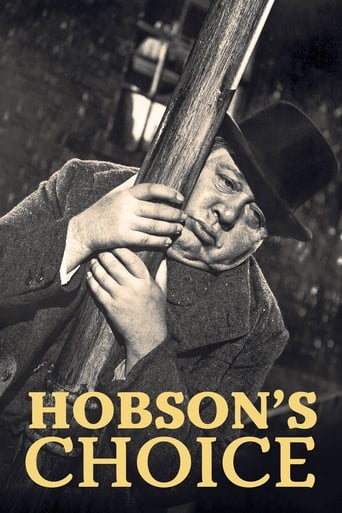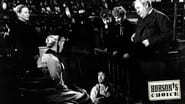JohnHowardReid
Producer: David Lean. Executive producer: Alexander Korda. A London Film Production, made in association with British Lion Film Corporation at Shepperton Studios, England. (Available on an excellent Optimum DVD). London Film Productions, copyright 18 June 1954 (in notice 1953) by British Lion Film Corporation, Ltd. Released in the U.S.A. by United Artists: 11 June 1954. New York opening at the Paris: 14 June 1954. U.K. release through British Lion: 19 April 1954. Australian release through Universal- International: 15 July 1954. Sydney opening at the Embassy. 9,675 feet. 107 minutes.NOTES: One of the best films of 1954. — Bosley Crowther in The New York Times. Best British Film of 1954. — British Film Academy.Third film version of the Brighouse play, originally filmed in 1920 by Percy Nash with Arthur Pitts as Hobson and Joan Ritz as Maggie. In the 1931 version, scripted by Frank Launder and directed by Thomas Bentley, James Harcourt played Hobson, Viola Lyel was Maggie, Frank Pettingell played Will, the wonderful Belle Chrystal essayed Vicky, Amy Veness was Mrs Hepworth, whilst two of the best character players in British cinema, Herbert Lomas and Kathleen Harrison, appeared as Jim Heeler and Ada Figgins, respectively.COMMENT: Enlivened by one of Malcolm Arnold's finest scores, and brilliantly over-scored by the gloriously prickly acting of Charles Laughton who consummately steals every scene in which he appears, Hobson's Choice is such a gloriously engrossing delight, we can even forgive one or two dull passages with Mills and de Banzie — and a Third Act that isn't anywhere near as uproariously funny as the first two. Fortunately, the brilliant David Lean is obviously aware of these shortcomings, for he's wisely retained the 1885 Lancashire setting of the Brighouse play, keeping it firmly in period throughout, with lots of grimy streets and cheek-by-jowl tenements brilliantly contrasted with the overstuffed bric-a-brac and crowded gew-gaws of the Hepworth drawing-room and the equally claustrophobic interiors of the various shops and establishments of Salford's main street.The photography by Jack Hildyard reveals his mastery of black-and- white. (He then set out to conquer color, winning a Hollywood award for Bridge on the River Kwai and photographing such other prestige blockbusters as 55 Days at Peking, The V.I.P.s, Battle of the Bulge and Casino Royale, as well as movies like The Millionairess and The Sundowners). Editing, art direction and costume design are likewise fine examples of superlative craftsmanship. In fact, all technical credits are absolutely top-grade. Director Lean obviously knows what he wants from the Brighouse play, and producer Lean has spared no expense in bringing the sets and characters to the screen. But Hobson's Choice is not just compellingly or even uproariously picturesque. Nor is it just also farcically funny. But it's a wonderful study of various characters under duress and how, inspired by one rebellious radical in their midst, they overcome their shackles.Although Laughton is rightly allowed to dominate the film, the other players too have their opportunities to make an impression. All seize those opportunities with such gusto, it would be wrong to single out one or two, but I'm going to anyway. The wonderful Helen Haye (see Wings of the Morning and The Man in Grey) stands up to Laughton with the wonderfully aggressive spirit of the rudely aristocratic rich (and even has no qualms in shaking down de Banzie for an usurious twenty per cent interest). And much as we admire the Dickensian Gibb McLaughlin's "old womanish" Tudsbury, or the hanger-on Joseph Tomelty's crawling Heeler, or even the short-changing Julien Mitchell's hotelier, it's the slurping, straw-hatted Denton, so compellingly played by Philip Stainton that gets our number-one vote for best supporting actor.All in all, despite one or two minor flaws, a gem of a movie.
elvircorhodzic
HOBSON'S CHOICE is a romantic comedy, which is characterized by fairly healthy humor. In the suburbs of Manchester lives a prominent shoe shop owner with his three daughters. A fairytale beginning of the story. Knowing the work of Mr. Lean, I expected something similar. However, the main protagonist is a tyrant, an alcoholic and a big stingy. His eldest daughter takes care of business and family. She is an extremely capable and smart woman. One day, after a domestic dispute, she decides to marry to a gifted boot maker in her father's shop ....The scenery is, as in any other film by Mr. Lean, very impressive. The opening scene is amazing. The director is in this case set up an interesting trap. In fact, already in the first scenes we can make hasty conclusions about the character of some of the protagonists. However, the characterization is being developed throughout the film, mostly in a comedy atmosphere and it includes many of the human virtues and flaws. Particularly fascinating is the relationship between a father, his eldest daughter and a unwanted son in law who takes the main role in the family at the end of the film.Charles Laughton as Henry Horatio Hobson is phenomenal in this role. He is the epitome of the grand egoism, and grumpiness. The protagonist who is evil, humorous and pathetic at the same time. Mr. Laugton is truly a master of the trade. Brenda De Banzie as Maggie Hobson is a fully realized character of a woman and shows a thorough, shrewd awareness of the secrets that every woman knows. However, she is a gentle and devoted wife. John Mills as Will Mossop is a collateral damage, if we ignore the end of the film. Son in law is to often a collateral damage. However, there is some symbolism. A smart and intelligent woman made a real husband and a businessman out of an ordinary, but talented guy.This movie is a little gem of the genre.
edwagreen
Charles Laughton was such a brilliant actor, and shows his mettle again-this time in a comedic performance as the tyrannical widower, a drunkard, who doesn't want his daughters to marry because of the money he has to pay out for such marriages to take place.As his eldest daughter, Brenda de Banzie is terrific. She, at age 30, has no intention of settling down to a grim spinsterhood in the tradition of Olivia De Havilland's "The Heiress."She is conniving and bright and sets her intentions on John Mills, a worker at the shoe company that Laughton owns. The film is devoted to how she made quite a man out of him so that he could successfully challenge his new father-in-law by film's end.
audiemurph
Let me start right off by saying that this may be the single greatest comedy of all time. Certainly the greatest I have ever seen. It is perfect from the first from to the last. Every scene, every line, is an absolute delight. Every character is appealing and full of great Brit eccentricism.In particular, John Mills as the evolving Willie Mossop, cobbler extraordinaire, may be the most likable character ever created in a movie. What a fine performance from one of England's greats.All right, let's get serious. British comedy has always been, to me, and many others, always funnier than our own here in the states. They are wittier and more playfully written, and the quirkiness of being British cannot be matched here. Let's face it, even the accents are just plain funnier. And this movie has it all in spades.Charles Loughton is perfect as the arrogant and haughty father and patriarch, whose daughters run rings around him.A couple of notes. First, the prolific Prunella Scales, who plays daughter Vicki, went on many years later to achieve immortality as Sybil Fawlty in Fawlty Towers with John Cleese. Second, the Victorian London accents are a little tough to follow at times, and I had to use closed-captioning to go back and read what the actors were saying at some points. Third, I found it amusing how the characters would leave out the definite article "the" in certain situations: "get back into shop!" and "going to dentist", for example. Any linguists have any comments? Finally, a little continuity error: when the wedding feast is done, John Mills removes a couple of items from a nearly empty table; moments later, when Brenda De Banzie comes by a few moments later, the table suddenly fuller, including having on it flowers that were not there before.In sum, this movie should be on every comedy and British movie lover's must-see list.




